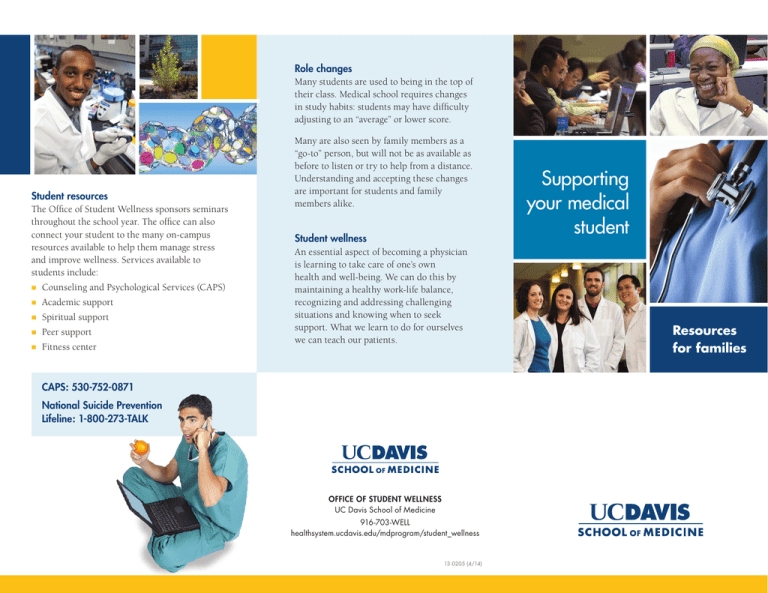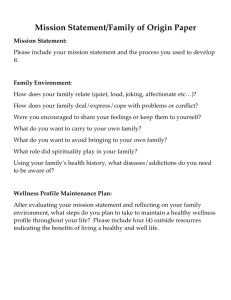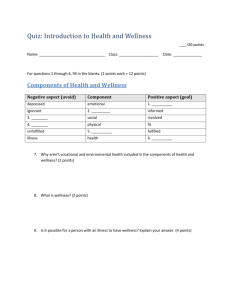Role changes their class. Medical school requires changes
advertisement

Role changes Many students are used to being in the top of their class. Medical school requires changes in study habits: students may have difficulty adjusting to an “average” or lower score. Student resources The Office of Student Wellness sponsors seminars throughout the school year. The office can also connect your student to the many on-campus resources available to help them manage stress and improve wellness. Services available to students include: Counseling and Psychological Services (CAPS) Academic support Spiritual support Peer support Fitness center Many are also seen by family members as a “go-to” person, but will not be as available as before to listen or try to help from a distance. Understanding and accepting these changes are important for students and family members alike. Student wellness An essential aspect of becoming a physician is learning to take care of one’s own health and well-being. We can do this by maintaining a healthy work-life balance, recognizing and addressing challenging situations and knowing when to seek support. What we learn to do for ourselves we can teach our patients. CAPS: 530-752-0871 National Suicide Prevention Lifeline: 1-800-273-TALK Office of Student Wellness UC Davis School of Medicine 916-703-WELL healthsystem.ucdavis.edu/mdprogram/student_wellness 13-0205 (4/14) Supporting your medical student Resources for families Resources for families Overcoming the challenges of medical school The physical and emotional demands of medical school can be some of the toughest your student has faced to date. Students can experience: Long hours Common medical student stressors FO UNDATI O NS BLO C K August – December Gross and Developmental Anatomy Overwhelming workload Human Physiology Academic pressure or difficulties Cell and Tissue Biology Changes in relationships Molecular Medicine Loneliness Doctoring 1 Financial debt The challenges of medical school can leave students feeling stressed, irritated, tired, anxious, even depressed, affecting their performance and well-being. You can offer invaluable support to your student by: • Listening Encouraging Understanding • • M EC H A NISM A ND DISE ASE BLO C K January – May E.N.R.G. – Endocrine / Nutrition / Reproduction / Genetics Microbiology Immunology Increasing pressure from: Society Pharmacology FINANCES ACADEMIC CHALLENGES PERSONAL EXPECTATIONS Academic pressure, no longer feeling “special” Remind them that they are talented, intelligent and that you love them unconditionally, independent of their grades Insomnia or sleep deprivation Encourage them to set regular schedules whenever possible, including breaks and sleep time Long work and study hours, even on weekends Set aside 15 minutes every day to talk Lack of exercise Help them develop an easy exercise routine they can incorporate into their class and study schedules Unhealthy diet Make home-cooked meals that can be reheated and eaten over a number of nights Understand that being too busy to talk is not personal, it’s the nature of medical school Go grocery shopping and fill their refrigerator with healthy snack, beverage and dinner options Doctoring 1 First year medical student curriculum. For a detailed calendar – including dates for instruction, exams and breaks – visit medschool.ucdavis.edu. Under Education choose M.D. Program, then Curriculum, and select the academic calendar for the current or upcoming year. Ask ahead of time if they can participate in events, instead of expecting them to participate Make it clear that it’s okay if they are unable to attend General Pathology COMMUNITY FAMILY Not being able to take trips home or visit outof-area family How you can help Unable to address the medical problems of family members Understand and accept that they are not the family’s doctor Unable to discuss patient-related issues Respect patient confidentiality; your student is adhering to federal regulations Feeling overwhelmed, anxious, or depressed Remind them again that they are loved and of resources available to them on campus; they only have to call 916-703-WELL



